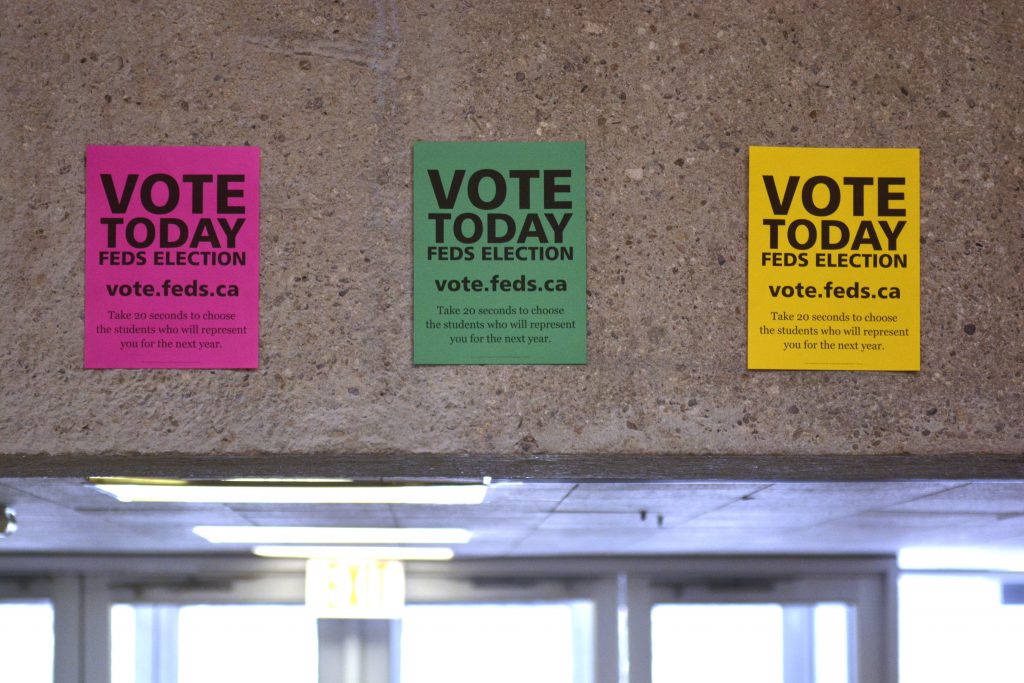
The Feds election process held each year gives candidates the opportunity to reach out to students and build a platform catered to them. However, for those unfamiliar with student government, it can be difficult to understand just what the candidates are promising and how realistic their promises are.
Sacha Forstner, whose extensive portfolio at Feds includes stints as an undergraduate senator, budget committee member, current secretary to student council and current Board of Directors member, sought to make the elections easier to follow this year by breaking down the platforms of each candidate. In a series of well-received posts put up on the Uwaterloo subreddit, Forstner explained the different promises of the candidates for each position and (based on his experience) how practical the promises actually were.
Imprint met with Forstner to get his impressions on the overall strengths and weaknesses of this year’s candidates.
Disclaimer: Forstner’s opinions reflect only his views, and not those of the Federation of students
Q: Are there candidates who you think are being a little too safe on their platforms?
Forstner: I expressed some disappointment when I was going through the platforms and critiquing them with all of the VP internal platforms as well as, to a certain extent, Brian [Schwan]’s platform in his re-election bid for VPOF. I don’t know if that’s a question of “being safe” or if it’s a question of being realistic and talking about what should be done. In the case of the VP internal platforms, the issue I tend to have is the same things appear on the platform every year, and they’re very general things that effectively amount to a rundown of what the portfolio is … I don’t know if it’s ‘safety” per se, but it’s not digging quite deep enough.
I was also somewhat disappointed with Schwan’s platform, mostly just because — there’s a lot of solid operational stuff in there, some nice, tangible promises like ‘We’ll have craft beer at Bomber’ — but I’m just more interested in the structural side of things. He mentions a new budget process, and that’s a good, solid project, but there are other things you might have to work on if you want the new budget process to be effective and meaningful, and he doesn’t talk about that much.
I was also disappointed, quite frankly, reading through [Team Reboot’s candidate Caleb’s platform. I think it was well-meaning, and with the exception of a couple things that have happened, a couple things that will happen or have just happened, and a couple things that are a little unrealistic, most of his platform does promise stuff that would be good to have. But you might call it ‘safe’ in the sense that it doesn’t really articulate a vision for what the president of Feds should do and where Feds should be steered to by the president. I found it underwhelming for a team that calls itself ‘Reboot Waterloo.’
Q: What do you think of Joshua Voskamp (Team Reboot VPOF candidate)’s claim about reducing the Feds fee by $12.50 a year?
Forstner: Put plainly, it is not a realistic promise. In fact, I would go further to argue that, at present, a reduction in the Feds fee, any incoming VPOF will learn, is not going to be in the fiscal interests of Feds. It will introduce significant risks to the organization at the moment that can’t really be mitigated any other way.
Joshua claims that he will reduce expenditures in order to cut the fee by $12.50. Reboot has indicated online that what they mean is not a $12.50 cut to the existing Feds fee, what they mean is a $6.25 per term cut, because you pay the Feds fee twice in a year, so that would work out to $12.50 a year. That is roughly a $350,000 net slash in revenue.
The majority of what they’re promising is roughly, by my count, $241,000 in salary cuts. Laying off staff is not realistic in Feds. Because of the rules that HR constrains us with, you can’t actually just come in and start laying people off. One of the things HR provides our staff with is stability, which is partly why people will want to work for Feds in the first place, otherwise it’d be difficult for a student union to hold onto staff in general…. An exec who’s in office for a year can’t just come in and start laying off staff.
It is possible to remove staff through restructuring, but restructuring has other costs. First of all, you make any change to a staff structure, and everybody has to get regraded, and inevitably there’s going to be someone on the top of the grade whose pay is going to be going up. So that’ll cost you. If you’re removing a staff member through restructuring, you also have to pay them severance, and the university has a severance formula they use that goes above and beyond what’s required in the Employment Standards Act. There some staff members who’d be entitled to 60 weeks or more of severance because they’ve been with us 18-25 years. Quite frankly, Feds is not financially in a position where that’s viable. It’s as simple as that. Cuts won’t work.
Q: Do you think Team Gold’s plan to make a sustainable, predictable Feds fee is practical?
Forstner: I think it is a practical promise, depending on how you want to go about it. I know we’ve talked about a need for this at the Board of Directors, and this is the other reason cutting the Feds fee would be a difficult thing to do. It’s not just because our internal budgets are expected to increase. You can get away with increasing the Feds fee by cost-based interests every year, despite those internal increases, as long as enrollment keeps growing. And for the moment, our enrollment is continuing to grow, but domestic enrollment is dropping and it’s going to continue to drop for the next five or six years — there are simply less people who will be graduating high school in those years.
Noting that, an enrollment drop for Feds puts significant constraints on the budget…. So what you wind up with is the necessity of fee increases.
So a strategy that says ‘over the next five years, these will be the fee increases we’ll make and nothing else’ would not be practical, and would expose the corporation to risk that I suspect the board would find unacceptable. However, you can put in a strategy that outlines the conditions under which fee increases can be made.
It might be possible to say ‘we’re looking only at cost-based increases for the next five years, with particular exceptions should the following situations occur, but we won’t accept other increases.’
I’m not a fan of project-based increases, and I think that that’s the promise that they’re trying to express here in their platform. If that’s what they want to do, I think that’s achievable. It’s more achievable than promising to cut the Feds fee at this point in time.
Q: What do you think about the team’s plans for co-op fees? Reboot is promising to advocate for lowered co-op fees, while Gold is aiming to do a deep dive in order to better understand the costs behind the co-op fee.
Forstner: There isn’t actually a whole lot of space between Reboot and Gold on this particular promise. Both of them mostly want to get the co-op fee under control. It’s coming from the same place, the same intent, and I respect that.
If you want to be realistic, the co-op fee’s not going to go down. It’s not going to go down for the same reasons that the Feds fee won’t go down, except those reasons are exacerbated.
No university unit will ever cut staff because the student union said so. If the staff association thought there was a risk of that, they would freak out. It would be a labour relations disaster. You can’t talk about staff cuts in a department without looping in HR. It’s just not a thing that happens.
You can talk about cutting costs, though, and that’s where this question of a deep dive comes in.
I’m going to be fair here and say that I don’t think Heather [Bone] actually opposes the idea of a deep dive. I suspect that both of them are actually in agreement on this.
To the best of my knowledge, there’s never been a deep dive into the co-op fee and into CECA (Centre for Career Action)itself. That is not a bad thing to do. The idea has been suggested to us, even, by the executive director of the CECA. They would be very keen on seeing a deep dive done, because it would come out with a more holistic understanding of how this fee is actually being used and where it’s actually going. And that does give us room, then, to identify where different parts of that department are duplicating effort, and streamline processes to at least make the fee more cost-effective. Again, that won’t stop the fee from going up, but it will at least hopefully curb the size of its increase. I think it’s just been increased starting in spring by another $30, but it doesn’t necessarily have to be that high.
It’s more realistic to want to do a deep dive into the co-op fee than to call for a cutting of the co-op fee, but I don’t think the candidates really diverge on what they want to do.”
Q: Do you have any thoughts on Reboot’s plan to crack down on “predatory third-party groups,” including Imprint?
Forstner: While I think it was a bit of stretch, maybe a misstep, to insinuate that Imprint is predating on students for their money to publish news — such a nefarious plan — I don’t know if the intent of what Caleb [Voskamp] said was to imply that he wanted to de-fund Imprint. Even addressing discussions at Feds council … the discussion didn’t strike me as particularly anti-Imprint in nature. I don’t think there’s this move to defund Imprint.
It does give me a little bit of pause that that’s where the focus of discussion is for Reboot. The single biggest fee students pay outside of tuition are the co-op fee (if you’re in co-op) and the student services fee. And both of those fees give the Feds exec direct opportunities to provide insight into them. I do find myself wondering why a Feds exec team would want to spend time looking into a fee that they don’t even administer, hosted by an organization into which they have no input.
This is why Feds never looked into the WPIRG fee, and it’s why Feds hasn’t so far looked into the Imprint fee. Because all we ultimately care about is first, whether students say they wanted the fee, and then, do these organizations continue to be student-driven and student-run? And from our perspective, yes. As long as there’s student involvement in it, why get involved in it when we’re so busy already involved in so much other stuff?
This is one of those things, if there’s a push to try and do something like reform Imprint or the recent push to get rid of the WPIRG fee, I really believe those efforts need to begin with the student body at large; it shouldn’t come from the Feds exec. In Imprint‘s case I think that’s particularly important since part of your mandate is holding Feds accountable, and that means holding the exec accountable.
Q: Do you have thoughts on the independent candidate, Jazbel Wang?
Forstner: Jazbel has a good bevy of experiences on this campus. She’s been a FOC (Federation Orientation Committee) member, which is a non-trivial job to do. She’s the current MathSoc president and she’s done multiple MathSoc executive roles in the past. I think she’s a very talented person. Her platform, when I went through and critiqued it, my feeling was it lacked clarity, compared to the others. All of the VP Internal platforms lacked something, in her case it was clarity.
This is partly why people run on teams in Feds elections. There are very few promises you can make that don’t overlap in some way with the needs of the other portfolios, and having a team with their own goals allows you to check each others platforms, fact check it a bit, challenge it a bit, and turn it into something a little bit more cohesive.
Knowing how busy Jazbel is this term, I applaud her for making the effort to run and putting together a platform. I just wish that there had been a little more thought put into it in advance and maybe she’d found a team to run with. With her running, it’s quite possible we could have had three very strong teams in this election, which would have been a sight to see.
Q: What do you think the strongest elements of all the teams are?
Forstner: In Team Gold’s case it’s their experience. When I talk about their experience, I don’t mean an understanding of how to do the job, per se. When I talk about experience, what I mean is two things. First, experience interacting with broad groups on this campus … The second thing experience does is it gives you an understanding of how the university works and how Feds works, so you can at least understand when you make a promise how you might get from Point A to Point B. That is impressive, and it impressed me, that’s why I decided to endorse Gold.
When it comes to Reboot, think the cohesiveness of their vision is admirable. Gold might have the understanding, but when you look at their platforms, they do tend to branch and stretch, and Reboot is pretty good at staying focused on the things they want. I’m not entirely sure what they genuinely want Feds to be for, but I do get a distinct impression of what they believe they should do as execs. They even say it on their platform — ‘maximizing value, representing your interests, strengthening our community’ — and you can tie all of their promises back into that in different ways. I think their ‘no pet projects’ value hasn’t necessarily played out how they thought it would — there are more pet projects in their platform than they probably intended — but I do think their platform does coalesce around some really nice, clear values about the importance of financial stewardship and making sure what Feds strives to be reflects what students come to Waterloo for.
Q: Anything else you wanted to add?
Forstner: Given all of my thoughts, I did make the decision to endorse Team Gold. I have a lot of admiration for both of the teams, as well as Jazbel, for putting together their platforms and for running. It’s not an easy thing running for exec; it’s not something I’ve ever chosen to do in my multiple years here, and it’s not easy thinking about. But in the end I chose to endorse Gold, and I want to speak to that just ever so briefly.
When all is said and done, it boils down to the question of what we want Feds to be for. And my honest feeling, having critiqued the platforms in detail and having looked at the relative experiences of the candidates, is that Reboot has not given a lot of thought as to what they want Feds to really exist for, just that they would like it to cost less. On the other hand, because of their experience, I do feel that these are people who actually believe in the potential of what your student union can theoretically achieve for you on campus.
Nonetheless, one executive team is not going to solve every problem that exists. That will never be true. It’s the question of bringing things in the right direction. And there were just enough promises in the Gold platform that struck the right note for me personally. A plan to review the long-range plan of Feds, adjust it if it’s not working, and develop some real metrics. A plan to design a new process for approving the budget. A plan to set up academic rights advising on campus … and even from the VP internal, though I was more disappointed with that portfolio, a plan to really flesh out the society relations commissioner role, from someone who is the current society relations commissioner and will understand what that role needs to come into its own. Those were steps that I think will move Feds in the direction it needs to move.
The biggest issue that I have personally had with Feds — as much as I believe in the organization as a current director — the trouble it will have is occasionally focus, as well as responsiveness. Those are two things that need work, and I think Gold understands those issues. I think both teams actually are united in their desire to question some basic perceptual norms about how Feds operates, and what Feds is, but I think Gold just has a clearer picture of how to address some of the existing issues and make it a more accessible, more responsive, more meaningful organization on campus.
Students can vote in the Feds elections Feb. 13-15 in the SLC or at vote.feds.ca.































